AccessComputing News - October 2017
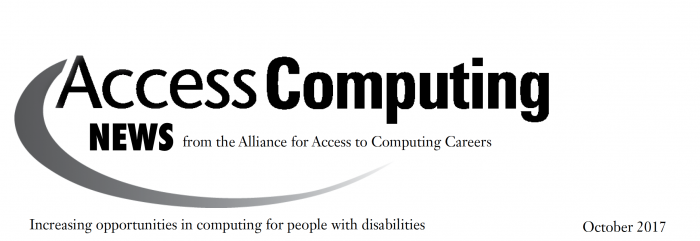
Below are the articles of the AccessComputing News - October 2017 newsletter. These articles can also be seen all on one page at the Full Newsletter option.
Daniel Sonnenfeld Receives AccessComputing Capacity Building Award
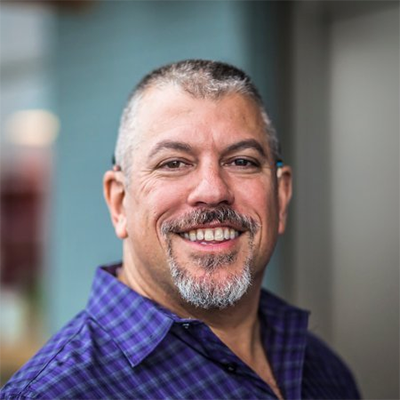
Daniel Sonnenfeld of Salesforce is the recipient of the 2017 AccessComputing Capacity Building Award. Capacity Building Award recipients are collaborators who have forged pathways that significantly advance people with disabilities in computing fields. Through their work and accomplishments, award recipients have changed the way the world views people with disabilities and their potential to succeed in challenging computing careers and activities. AccessComputing Principle Investigator (PI) Richard Ladner presented the award to Daniel at Tech Inclusion San Francisco. Daniel is the first industry representative to win the award.
Daniel is the technical program management director at Salesforce and is a long time AccessComputing collaborator. He mentored students who participated in the Summer Academy for the Deaf and Hard of Hearing and has continued mentoring students who are deaf and hard of hearing since. Last year, he gave a plenary presentation about his experiences as a deaf computing professional at the Tapia Celebration of Diversity in Computing. When AccessComputing launched our industry partner program, Salesforce was one of the first industry partners due to Daniel's leadership.
Yes, I Have Retired, But...
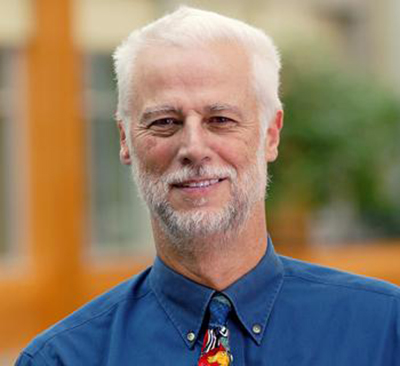
As of February 1, 2017 I formally retired from the University of Washington. I am now a professor emeritus. Luckily, the university allows people to work up to 40% so I am continuing to work as a PI for AccessComputing and AccessCSforAll. In addition, I still have two PhD students to finish mentoring through their final academic year. The university will continue to give me an office and staff support, which is awesome. In June I gave my "Emeritus Lecture" titled "My 45+ Years at UW" which was video taped and will be available soon, with captions, of course. View the video online at www.cs.washington.edu/events/colloquia/search/details?id=2986. The entire lecture was about 75 minutes.
There are many positives about being retired. I can do whatever I want to do. I can tap into my retirement fund, which is substantial after 45+ years. I can continue working for things I believe in. I am fortunate to be in good heath and have a supportive family. I highly recommend retirement whenever you are ready and able.
DO-IT Enters Disability Mentoring Hall of Fame
One of AccessComputing's lead organizations, DO-IT (Disabilities, Opportunities, Internetworking, and Technology), is honored to be inducted into the prestigious Susan M. Daniels Disability Mentoring Hall of Fame. Granted by the National Disability Mentoring Coalition, this award recognizes outstanding leaders who mentor individuals with disabilities. DO-IT has facilitated an online mentoring community to support people with disabilities as they transition from high school to college and from college to graduate school and careers since 1992, recognized early on through the National Information Infrastructure award as the first of its kind.
Susan M. Daniels, for whom the Hall of Fame is named, spent much of her early life in rehabilitation settings due to complications from Polio. She earned a Ph.D. in psychology and was an active advocate for disability rights throughout her lifetime.
We are honored to be inducted into the Hall of Fame. Individuals with disabilities make our communities more vibrant, diverse and inclusive. We share this award with the mentors in our programs who serve as advocates, guides and role models for others. DO-IT’s success can be measured by the impressive accomplishments of DO-IT participants, including AccessComputing team members over the years.
Read the full story here.
Team Member Profile: Bec
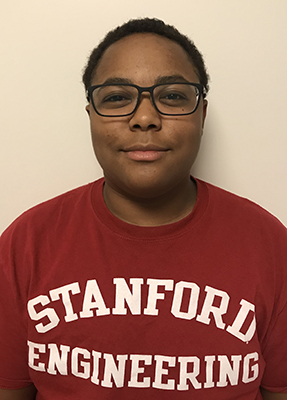
I am a sophomore at Stanford University majoring in Computer Science and specializing in Human-Computer Interaction. This summer, I participated in an REU (Research Experience for Undergraduates) internship on campus. For my project, I conducted research in partnership with the Psychology Department and studied how much people exercised when shown false data that inflated or deflated the number of steps they took.
I found out about the internship by emailing Jacob Wobbrock of the University of Washington (UW). I was interested in his research and wanted to work with him over the summer. After expressing my interest, he directed me to AccessComputing and helped me find a mentor at Stanford. My mentor, James Landay, is currently a professor at Stanford and used to be a professor at UW.
In high school, I learned Java and Python in the classroom and taught myself Swift. I created and deployed several iPhone apps my senior year of high school before moving on to learn C and C++ in college. My project this summer involved a lot of work with the Apple Watch, which required me to brush up on Swift.
I had an awesome experience working as a team with so many interesting people. Working with graduate students and hearing their stories post-undergrad was very rewarding and informational. It was also a great networking experience.
I had an excellent time working at Stanford in the REU program. AccessComputing has helped me in so many ways, and I would recommend getting involved in research to anyone. Being able to do what I love for an entire summer was a priceless experience.
New Grant on K-12 Computing Education for Students with Disabilities
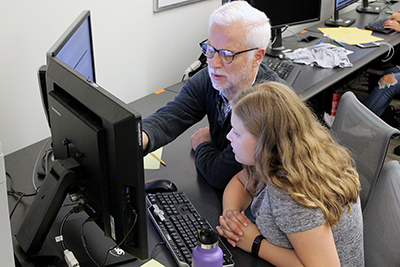
K-12 students with disabilities in computing courses may encounter tools and curricula that are inaccessible to screen readers used by students who are blind or have reading-related disabilities such as dyslexia. Content embedded in images without text-based alternatives accessible by screen readers also creates barriers. Students who are deaf require captions or transcriptions of audio content and students with disabilities can benefit from curricular features that facilitate access to them.
We have received a new National Science Foundation grant, AccessCSforAll (#CNS-1738252 and #CNS-1738259),which will create a research practitioner partnership with schools that serve students who are deaf, blind, or have learning disabilities as well as mainstream schools to test the effectiveness of an accessible version of Advanced Placement Computer Science Principles. Richard Ladner from the UW and Andreas Stefik from the University of Nevada Las Vegas are PIs. Sheryl Burgstahler from UW is a co-PI. The project will also develop resources for computer science teachers to help them include students with disabilities in their courses and partner with the College Board to ensure that they are ready to properly evaluate students with disabilities. We also plan to continue to provide individualized support for teachers working with students with disabilities.
As part of the CSforAll Summit, held on October 17 in St Louis, MO, AccessCSforAll committed to create and test a fully accessible AP Computer Science Principles course to ensure that students with disabilities of all kinds have the opportunity to learn basic computer science by December 2018.
Interested in learning more about computing education for K-12 students? Check out our video Quorum: An Accessible Programming Language in the 2017 STEM for All Video Showcase, which won a Facilitators’ Choice Award.
Read more about the work we’ve done so far in "AccessCSforAll: Making Computer Science Accessible to K-12 Students in the United States" in the June 2017 SIGACCESS Newsletter.
Making Your Presentation Accessible
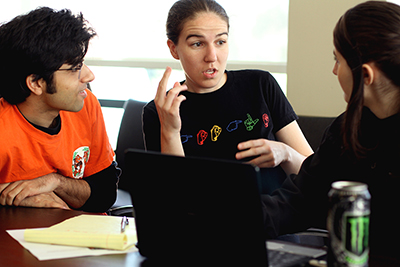
AccessComputing PI Richard Ladner and AccessComputing Partner Kyle Rector recently published an article in the Association for Computing Machinery’s Interactions on Making Your Presentation Accessible. Their advice can help to ensure that presentations are more accessible not only to individuals with disabilities but also those who may be attending a session remotely or who are not native English speakers.
Advice includes the following:
- Minimize the amount of text on slides to keep the focus on what you are saying. Pause to allow individuals a chance to read the slide and read it aloud so individuals who cannot see the presentation know what is on the slide.
- Minimize the number of visuals on slides. Describe images, graphs, and charts for individuals who are visually impaired.
- Use high contrast and take care with colors.
- Avoid or control the speed of animations so they can be described fully.
- Make sure that videos are captioned and audio described. Give a brief description of the video before it starts to help give context.
- Make sure the Q&A period is accessible. If there is a microphone for audience members, be sure they use it. Repeat questions that are asked.
Check out Kyle’s video Making Presentations Accessible for more information.
My Trip to the Tapia Celebration of Diversity in Computing
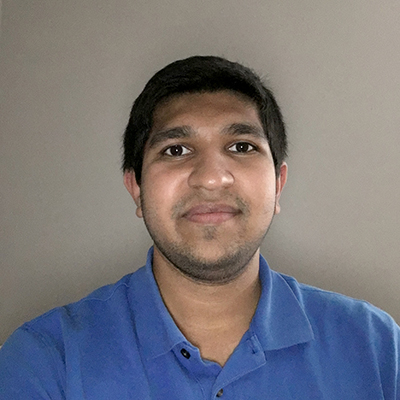
As a senior in college, it is crucial for me to prepare for the next phase of my life. I want to find a full time job as a software engineer at a reputable technical organization. Over the summer, I got an announcement from AccessComputing regarding the opportunity to go to Association for Computing Machinery (ACM) Richard Tapia Celebration of Diversity in Computing. I had not heard of the conference before, and I was really happy to learn that there is a conference that celebrates ethnic diversity and people with disabilities and that helps a diverse group learn more about the field of computing.
I immediately applied for AccessComputing funding so I’d have a chance to go to this conference. Luckily, I was given that chance. I was looking forward to meet representatives from multiple companies and universities and learn about their work and network with them. Once I got to Atlanta, I was shocked by the actual number of people who attended the conference. From day one, I met fellow students who were in the same position as me. Many were also first time attendees – we were all highly excited to be a part this conference.
Most of my time in the conference was spent networking. I was able to network with students from various institutions and learn from their stories and experiences in the computing field. I went to the career fair and networked with multiple recruiters. I learned about companies and the innovative research they were conducting to help humanity. I attended panels, workshops, and sessions that gave me insights about artificial intelligence research, finance and technology, data analytics, and science. From 7:00 a.m. to roughly 10:00 p.m. I was constantly meeting new people and learning new and interesting information about computing.
Without the help of AccessComputing, I would not have been able to meet such a diverse group of people, network with endless number of recruiters, and enjoy four days of an amazing experience. I was also given a chance to interview with multiple companies both during and after the conference. None of this would be possible if I was not given a chance to attend this wonderful conference. I would sincerely like to thank AccessComputing for encouraging people with disabilities to branch out and be a part of a conference that brings people together and celebrates diversity on a grand scale.
The Best Aspects of Tapia
Here are some experiences from other AccessComputing team members from the 2017 ACM Richard Tapia Conference:
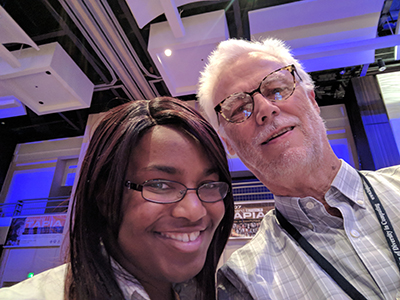
Kiara
I was excited to attend the career fair to get my resume to interested companies, as well as watch and participate in discussion panels such as To Disclose or not Disclose: A Question of Accommodations in the Technical Workplace. This panel was especially helpful since each time I get to each interview stage, I am always wondering how or what I can suggest to ensure that communication goes well enough during the interview. I learned how and when to ask for accommodations, and what accommodations work better in different situations.
Shareef
Tapia was great for networking, and I tried to make contact with graduate schools and big companies like Google, Microsoft, and Amazon. During the Google's DevOps (Development Operations) workshop, I got the chance to connect with Google engineers, learn more about the positions they offer, and whether I was going about the process correctly. I was happy to be able to network with them and ask questions about the interview process.
Anna
The best part of the conference was getting to meet other people with disabilities studying computer science and related disciplines. Building a sense of community is powerful. We were able to share ideas and resources. I shared my techniques for using speech-to-text tools to write up math problems with a fellow student who has difficulty with handwriting and slow typing speed. I also left the conference with a couple of open source software projects to investigate.
Attending the career fair was really beneficial to me from a professional development standpoint. Seeing that several employers were genuinely impressed with my resume gave me a confidence boost and made a career in industry seem like a real possibility. I also gathered information on lots of potential internship opportunities, had a short interview with one company, and got some feedback that I will use to fine tune my resume.
During the introductory "orientation" session, when the speaker asked for questions, I pointed out an accessibility issue that I had noticed during the presentation and asked if anything could be done about it. Though my particular concern did not get an especially satisfying response, I was proud of myself for saying something, and several students later thanked me for pointing out that there was a problem.
AccessComputing Resume Database Launches
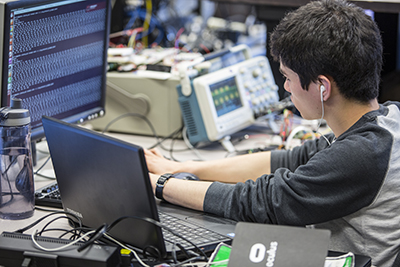
AccessComputing has launched a resume database populated with resumes of computing students and recent graduates with disabilities. AccessComputing Industry Partners can access the database to help recruit interns and employees with disabilities. Students who are interested in contributing their resume, should join the AccessComputing student team.
AccessComputing Industry Partners are companies that are working to make the technical workplace more welcoming and accessible to computing professionals with disabilities. Four companies are currently industry partners: Lawrence Livermore National Labs, Microsoft, Salesforce, and Yahoo!. We look forward to recruiting new partners now that this tool is available.
For more information about the Industry Partners or the resume database, email accesscomp@uw.edu.
Team Member Profile: Samsara
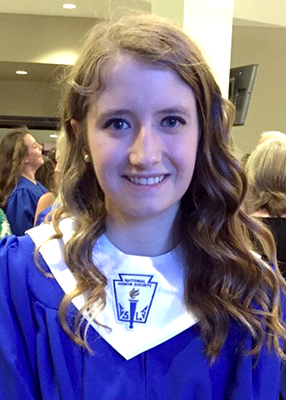
My name is Samsara, and I'm a junior double majoring in computer science and mathematics at the George Washington University. This summer I worked at the University of Maryland College Park at the Combinatorics and Algorithms for Real Problems (CAAR) Research Experience for Undergraduates (REU), funded by the National Science Foundation (NSF), in the Computer Science department. I worked on two artificial intelligence projects, advised by Professor John Dickerson.
The first was designing and implementing a system using deep reinforcement learning to learn optimal matching policies for kidney exchange in a dynamic setting. Specifically, I found and improved a graph embedding function to process directed, weighted graphs into fixed-sized vectors for input into a neural network that is invariant under graph isomorphism.
The second project was developing a system using reinforcement learning to ensure diversity and fairness in an automated admissions process. I analyzed past admissions data to investigate the possibility of bias in previous decisions.
I found out about CAAR and other math and computer science REUs from the NSF’s website. This summer validated my inclination towards theoretical computer science research and going to graduate school. I loved collaborating with peers and pursuing exciting, unsolved problems, teaching myself as I went. The computer science department hosted talks that were fascinating, and the quality of students and faculty involved in the REU was unparalleled.
While working at the REU, I learned two essential strategies for research. Though I had never taken courses in the subjects I was researching, I learned to hone in on the things I did not know, rather than feeling overwhelmed that I did not know so many things. Furthermore, I learned flexibility as a researcher. Sometimes promising directions hit dead ends, and knowing when to give up and move on was an important balance.
After the summer, I am continuing research with my advisor and pursuing my own online harassment research project under his guidance. I intend to work with him for the next two years of my undergraduate career. We submitted our first paper on the admissions process last week to a conference, so hopefully, I will attend. The kidney exchange paper is still in the works. In addition, I now have friends all over the country who will attend computer science graduate school programs at the same time as me.
I would highly recommend working at an REU to every undergraduate who has considered doing research, attending grad school, or simply loves learning about computer science or another topic related to computing. REU programs are generally very small so they are an excellent way to dive into computing research and gain knowledge about different fields. In addition, the director of my particular program was very accommodating to students with disabilities, so I would hope that other program directors would act the same.
About AccessComputing
Led by the Paul G. Allen School of Computer Science & Engineering, the Information School, and DO-IT (Disabilities, Opportunities, Internetworking, and Technology) at UW, AccessComputing is supported by the National Science Foundation (NSF) (Grant #CNS-0540615, CNS-0837508, CNS-1042260, CNS-1539179). Any opinions, findings, and conclusions or recommendations expressed in this material are those of the authors and do not necessarily reflect the views of the NSF. For further information, to be placed on the mailing list, request materials in an alternate format, or to make suggestions for project publications or web pages, contact us:
AccessComputing
University of Washington
Box 354842
Seattle, WA 98195-4842
accesscomp@uw.edu
www.uw.edu/accesscomputing/
206-685-DOIT (3648) (voice/TTY)
888-972-DOIT (3648) (toll free voice/TTY)
206-221-4171 (FAX)
AccessComputing Principal Investigators:
Richard Ladner, PI
Sheryl Burgstahler, Co-PI
Amy J. Ko, Co-PI
Jacob O. Wobbrock, Co-PI
Brianna Blaser, Project Coordinator
Kayla Brown, Project Coordinator